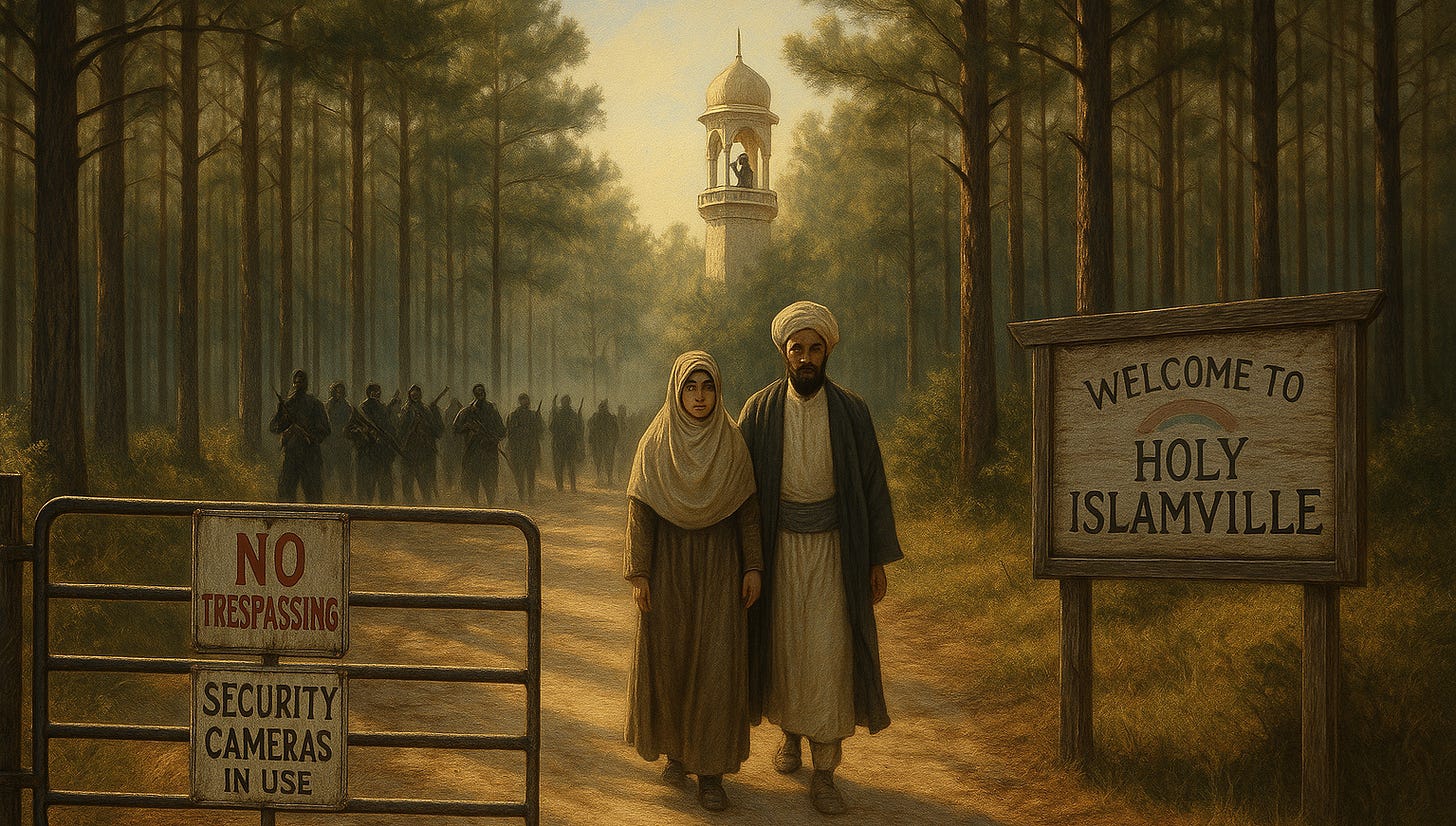Holy Islamville: The South Carolina Islamic Enclave Founded By A Pakistani Terrorist
A Secretive Muslim Community, Established By A Pakistani Cleric With Ties To Islamic Terrorist Organizations, Has Been Tucked Away In South Carolina For Forty Years
In the wake of President Trump’s B-2 Bomber “Operation Midnight Hammer”, a surprise strike on Iranian nuclear infrastructure, concerns have surged nationwide about possibility of retaliation on American soil. With tensions still unsettled in the Middle East, chatter has turned toward the risk of sleeper cells hiding in plain sight, particularly after the Biden administration allowed tens of millions of undocumented people to enter the country. Over the past week, we have received several emails from readers asking a very pointed question: “Are you aware of a place called ‘Islamville’ in South Carolina?” As it turns out, we were, and have been for about a decade. With everything going on, it’s worth revisiting the story behind this private, secluded, religious community nestled deep in the South Carolina upstate.
“They keep to themselves, polite but quiet. You’d never know they were there unless you drove past the gate, or hear ‘pop-pop’ from some guns over that way. But you always know it’s them when you seem them by the way they dress” - Reader “Matthew” of York, SC
“Holy Islamville”, founded by members of a group called Muslims of America, has long flown under the radar of most South Carolina. But for those living in and around York County, its presence has sparked both curiosity and concern. The enclave operates as a self-contained religious community based on strict Islamic teachings, and has been linked to an infamous Pakistani cleric. While the residents themselves have been described by Winthrop University students as peaceful and reclusive, questions periodically surface about what exactly goes on beyond the community’s gates.
Holy Islamville was established in the early 1980s by followers of Pakistani cleric Sheikh Mubarak Ali Gilani, a controversial Islamic pastor, sometimes referred to as a cult leader, who also founded the group known as Muslims of America. Gilani encouraged his American followers to retreat from urban life and build rural Islamic communities cloaked in secrecy. While the organization Muslims of America publicly rejects violence and insists it has no affiliation with terrorism, Gilani has long been associated a violent organization called Jamaat al-Fuqra, which orchestrated terrorist attacks in the U.S. and Canada during the 1980s and 1990s. Jamaat al-Fuqra was never officially designated a terrorist group by the U.S. State Department, even after being linked to a string of violent attacks in the United States and Canada. Jamaat al-Fuqra, with alleged ties to Al-Queda and other extremist groups, has continued to cast a long shadow over Gilani’s American enclaves. They include Islamville in York County, “Islamberg” in New York, and a lesser known community near Red House in Charlotte County Virginia.
“Terrorism experts said the compound's leader is a radical who supports jihad” - Charlotte NC ABC News Affiliate WSOC-TV9 in 2010
Several times in its forty-year history, law enforcement has been contacted regarding the Islamville compound. Among the most reported concerns have been the sounds of gunfire—rapid and constant volleys reported by local veterans and residents which suggest more than just a casual afternoon at the range. In 2002, York County deputies responded to such complaints, though no charges were ever filed. FBI records, as reported via Clarion, state that Muslims of America members were encouraged to travel to Pakistan to receive religious and military training from Sheikh Gilani and his followers. The idea of a militarized and cloistered religious compound (regardless of what religion) should raise eyebrows, particularly in an America so polarized.
“A secretive organization—it publicly operates under the name Muslims of the Americas (MOA)—has been known to law enforcement since the 1980s for dozens of violent and white‑collar crimes in North America. It has been described by prosecutors as advocating 'the purification of the Islamic religion by means of force and violence” - Christopher Heffelfinger, Combating Terrorism Center at West Point
What makes this all the more unsettling for many is Islamville’s proximity to South Carolina’s vital Nuclear infrastructure. The community sits a 15 minute drive from the Catawba Nuclear Station—a cornerstone of energy production in South and North Carolina. Whether coincidental or not, this is a detail that gives most aware of it pause. With nuclear energy now back in the spotlight, its protection from sabotage—domestic or otherwise—has become a renewed priority.
In recent years, former members of Sheikh Mubarak Ali Gilani’s following have taken to social media and public forums to denounce the movement, describing it as a cult-like organization marked by secrecy and manipulation. These ex-members have accused Gilani of preaching doctrines that deviate sharply from mainstream Islamic teachings, and some have gone further—alleging instances of physical and emotional abuse, the exploitation of women, and even the abuse of children within the following.
Though Sheikh Mubarik Ali Shah Gillani passed away in May of 2021 at his home in Lahore, Pakistan, his influence continues to loom large over the communities he founded in the United States. Followers still revere him as a spiritual patriarch, honoring him with exalted titles such as “His Holiness”, “the true alchemist of the soul”, “guide & leader of all mankind” and “Descendant of the Prophet Mohammad”. In their tradition of Islam, where spiritual lineage and leadership carry deep meaning, Gilani is remembered not just as a teacher but as a divinely guided figure whose words and vision continue to shape their daily lives, teachings, and identity.
“With everything going on overseas and the border being wide open for so long, it worries me that this place could become a hide-out, and one day just BOOM! They could hit us like they did Israel on October 7” - Reader “Margaret” of York County, SC.
To be perfectly clear, we are not suggesting that the residents of Islamville are a threat to anyone’s security. There is no evidence to tie the present members of this community to any criminal or terrorist activity that we are aware of. Indeed, those who live there may simply wish to practice their faith in solitude. That said, Islamville and other secretive communities founded by terrorist leaders are emblematic of the kind of enclaves that could become conduits for those in our country who mean to do us harm. They could become places from which deadly internals strikes are planned and carried out. In times like these, vigilance is not paranoia—it’s prudence.
Some will ask why Islamville should face scrutiny while other religious enclaves—such as Amish settlements, Jewish communities, or Christian monasteries—do not. The answer lies not in religion, but in history and security implications. Unlike those other groups, Islamville was founded by a radical cleric with ties to terrorist groups responsible for violent around the world. What sets this community apart is not its faith, but its genesis: repeated concerns over military-style training, ties to terrorists in Pakistan, and the continued veneration of a man who embraced violence as a legitimate tool of Islam. Religious freedom is essential, but it does not exempt any religious group— Muslim, or otherwise—from public scrutiny.










